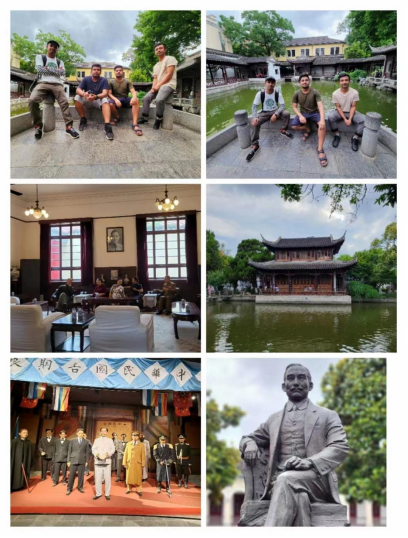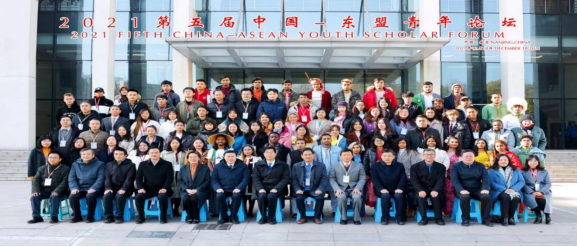Nanjing Tech University FIROJ BADSHA 202024404005
I arrived at Nanjing on an ordinary day in early autumn of 2020 when the sky was aglow with sunset colors, seeing the Nanjing Lukou International Airport bathed in a beautiful golden glow. The senior student who came to pick me up waved to me at the exit, and the friendly smile on his face instantly reduced my anxiety.
In 2018, I graduated with excellent scores from a high school in Chittagong (officially Chattogram). I dreamed of majoring in international business management at an American university. However, the high tuition fees were an unbearable burden for my parents, and my mom and dad were worried about my future. One day, my mom took a newspaper home with an ad on it: “Full scholarship to China”. China and Bangladesh enjoy a long-lasting friendship. But I never knew that China has scholarships to encourage our Bangladeshi students to study in China or that China has majors taught in English. I was always worried that I wouldn’t have the opportunity to go to China because I didn’t know Chinese and didn’t understand Chinese culture. It wasn’t until that newspaper ad that gave my mom and me new hope.
When I actually arrived in China, I realized how lucky I was. At the very beginning, I could only say two Chinese words, “nihao(hello)” and “zhege(this)”, which was quite useful in daily communication. Wherever I went, I would say these two words and get what I needed. During the daily conversations, the Chinese people would always teach me the exact words I wanted to say gently and patiently. Thanks to them, I became less embarrassed and anxious about speaking in Chinese.
Initially, I favored Bengali food, so I ate a lot at the Muslim Restaurant on campus. One day, my Chinese friend took me to a Chinese restaurant for dinner, and I was fascinated by Chinese food. That day, my friends warmly invited me to enjoy each dish and explained the ingredients to me. The whole approach to ingredients, seasoning, cooking and tradition was so moving and impressive. I had never experienced a meal with so many different flavors. Each dish fit spicy, sour, salty, sweet, chewy, crunchy and slippery into one meal. Since then, my heart has been captured by Chinese food. I even tried to learn how to use chopsticks in order to eat more delicious Chinese food.

(Nishan Mountain)

(the Great Wall)
There are many Chinese companies in Bangladesh where Bangladeshi staff with some China-related knowledge and skills are in demand, and they often make it to the middle management of the company. Therefore, once I arrived in China, I made efforts to make friends with Chinese people and travel so as to enrich my experience in China. Everywhere I went, the Chinese people were always kind and welcoming. The kindness removed the language and cultural barriers. And instead of feeling awkward, our communication, mixed with gestures, English and Chinese, was fun for both sides.

(Yuejiang Tower)
But what really made me passionate about Chinese culture was not just the poems I had to remember or the products I saw in the exhibition hall, but the excellent qualities embodied by the Chinese people in their daily lives. During my studies, I was amazed by my Chinese classmates. They studied really hard, cherishing every minute of every single day. In the morning, there were even students on campus who rode their bicycles to class and ate breakfast while trying to get to class earlier to preview the textbooks before class started. Chinese students also respect the teachers very much. No student has an excuse to leave the classroom during class, but they concentrate on every minute to learn, which is unbelievable in some countries. I realized that this is probably why China is growing so fast.

(Softball Tournament)
As a Muslim, I was afraid that there was nowhere I could pray in China. But when I really came to China, all my worries disappeared like mist. China is a country with many religions. Whether it is Buddhism, Taoism, Islam, Catholicism, and Protestantism, they can all be found in China. And with many Muslims and mosques in China, not only did I not have to worry about not having a place to pray, I was able to make many local Muslim friends. Whenever I pray with local Muslims in a mosque, I have a greater love and appreciation for the tolerance, diversity and friendliness of China.

(Nanjing Presidential Palace)
As a young person, I was surprised by the remarkable progress China has made in technology. In addition to the convenience and efficiency of high-speed railways, I was amazed by the cashless payment and online shopping in China. Now I can just take my cell phone with me when I go out, and I can just go online to find what I need to buy, and use WeChat or Alipay to make transactions. In China, food delivery service has become a second choice for people as well. With just a few clicks, I could order meals through takeaway apps such as “Meituan Waimai”- and ultimately I just had to wait indoors in the comfort of the dorm for the food. Sometimes, I secretly resolve to make my hometown use all the good software in China as soon as possible, which can bring much convenience and gradually changes our lifestyle.

(First time I saw snow)
Because of the development of technology, transportation here is very convenient and cheap. Now if I want to go out, I don’t need to wait for a cab on the road, I can just book a cab on the cell phone app. If I take public transportation, there are more than a dozen subway lines in Nanjing; and the bus, no matter how far I go, probably only costs 2 RMB. It’s even cheaper if you buy a bus card and swipe it every time you take it.
Sometimes I feel lonely because of my nostalgia. At such times, my Chinese friends and teachers always comfort me and cheer me up. My teacher, Prof. Xue Liqing, always talked to us in class about nostalgia, family and friendship in Chinese poetry, and used wonderful poetry to help us chase away loneliness and experience the hope and vitality of life. All these make me optimistic again. And the volunteer work, the rich programs and competitions such as tai chi, language club, and the cultural activities such as museum visits and Chinese painting experiences make my life even more energetic.

(China-Asean Youth Scholar Forum)
For three years, more than 1050 days and nights, countless wonderful and kind people taught the boy in Chittagong, Bangladesh, who could only say “nihao” and “zhege”, to smile and say: “Hello, China! I love you, China!”